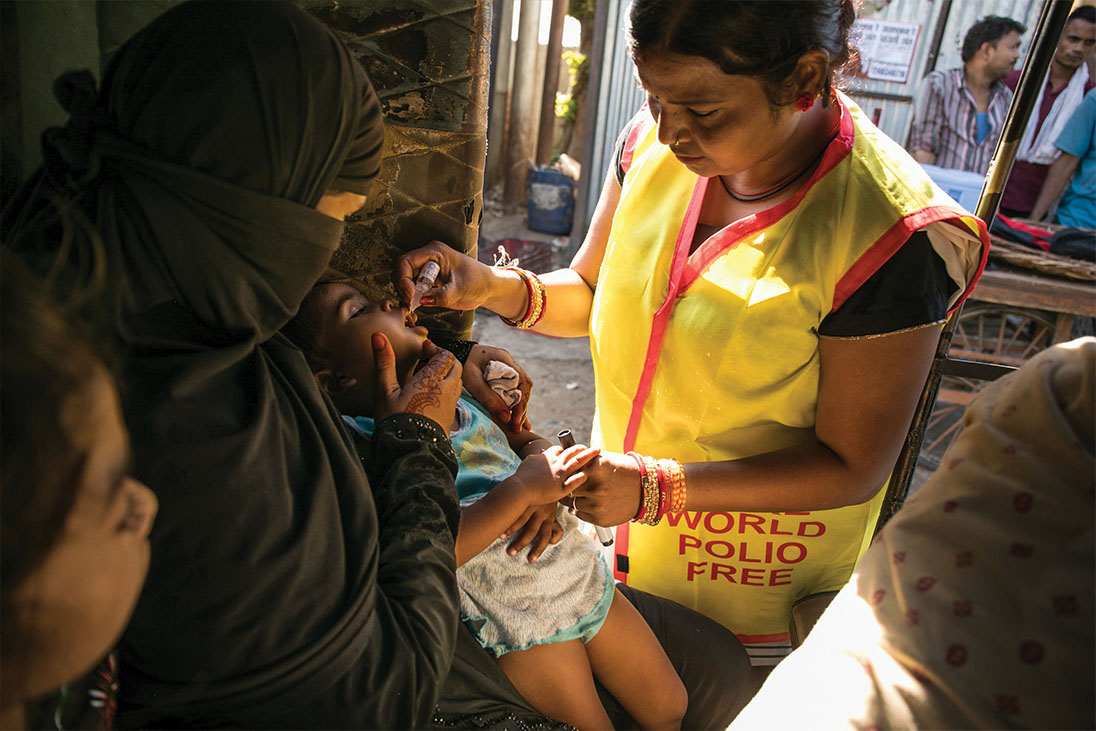The COVID-19 pandemic has had an impact on our lives in a way we scarcely could have imagined six months ago, never mind when Tom Griffin was elected to become Rotary in Great Britain and Ireland President over two years ago.
Rotary, like many charities, service organisations and not-for-profits, have been delivering essential support for people nationwide. While their importance isn’t in doubt, what the future might hold for them very much is.
In an extensive Q&A interview, Tom spoke to Rotary magazine Editor, Dave King, about the challenges and opportunities that lay in the year ahead.
DK: Tell me about how you first got involved with Rotary.
TG: My Rotary journey is interesting. I have been in Rotary 36 years this year.
I joined Rotary in 1984, but attended my first Rotary meeting when I was 18. The story goes that towards the end of each academic year, Kirkintilloch Rotary Club, just outside Glasgow, invited a school leaver to talk about what they were going to do when they left. And in my year, it was me! I spoke to them at their club meeting, telling them about what I intended to do with my career once I had studied law at university.
Like all Rotary clubs, this club was very much part of the community, and its members were community leaders.
So how did you come to join Rotary?
In 1972, I moved to Ayrshire and got involved with some co-operation projects between Round Table and Rotary, both service organisations doing good things locally.
Then in 1984, I joined the Selkirk Rotary Club in the Scottish borders. My relocation for work has meant I’ve also been a member of Maldon Rotary Club in Essex and now Woodbridge Deben Rotary Club in Suffolk, where I still am today.
Why did you want to become Rotary in Great Britain and Ireland President?
There are two reasons. First of all, I think we need to change. And I believe that I have good ideas about the kind of change we need to make. I am quite good at introducing change.
And also I felt that Rotary GB&I needed to become more business-like in the way it organises itself, in the way it plans what it is going to do and the way it measures what it is achieving. I feel with my experience acquired professionally from working in local government, I have the skills to help it to do that. Remember that local government too is a multi-functional, service organisation operating in the public eye.
I think there is a big, big challenge arising out of COVID-19 but there is also big opportunity.”
Do you think Rotary has lost sight of being business-like?
People join Rotary to do good and quite often they want to leave their business background and do something different. I’m not sure they necessarily see an organisation like Rotary GB&I as a business.
Clearly, General Secretary Amanda Watkin and her team at the Rotary Support Centre are there to run it as a business, but the volunteers, in my view, need to understand that too.
They need to understand this by having a clear idea of what we as an organisation are trying to achieve, how we are going to achieve that and making sure that we are achieving it. If we are not there to help clubs to develop their membership, or helping clubs improve and develop the service they deliver to their communities, then why are we there?
You are taking over the Presidency of Rotary in Great Britain & Ireland at an unrecognisable time. When you were elected, no-one could have envisaged where we are today. How are you going to deal with that?
I have mixed feelings. The difficulty is that we don’t know what is going to happen. Fortunately we’ve seen lots of examples of how Rotary members and clubs are adapting, both in terms of how they meet, and also the projects they are delivering locally, during hugely challenging times.
We have seen in wider society that the impulse to volunteer isn’t dead. That is plain to see from the number of people coming forward and volunteering in the current crisis. We are adapting to provide worthwhile opportunities for younger, working people, but we can always do better.
So there is an opportunity there if we can grasp it.”
To be a member of Rotary there is no longer the significant time and cost commitment there once was. Times are changing. The traditional format of meeting at the same time each week for a meal and a speaker isn’t what everyone wants. We’ve seen clubs adjust by meeting online during the crisis – why don’t we do more of that?
So there is an opportunity there if we can grasp it. And there is an opportunity for clubs to change. Loads of clubs will be happy with these new ways of working, and so will their communities.
This is the sort of different direction we need to be travelling in, to appeal to the way people want to network and socialise today.
So that means starting a whole range of new clubs which meet informally, maybe they will meet online, perhaps when the world returns to normal they will meet in cafés for an hour or so. They will concentrate on service and modern ways of socialising.
I think there is a big, big challenge arising out of COVID-19 but there is also big opportunity.
It’s a good point. But during this pandemic, various community groups have formed, and these are potential Rotary members who have discovered volunteering. The question is, what is in it for them to join Rotary?
There are two things. At the moment, community groups are forming and just operating. In the normal world, they will have to tackle all sorts of bureaucratic and complex issues such as safeguarding, disclosure and barring, insurance. Rotary has the structure to deal with that.
Secondly, I saw some research recently about millennials asking what are millennials looking for in their life? And one of those things is to be part of something bigger which makes a difference.
The big thing about joining Rotary is that you can be part of a local community organisation, doing good in your locality, but at the same time be part of a global organisation which can do good overseas and make a difference in the developing world.
So Rotary has two selling points. Firstly, we take the hassle out of organising volunteering. Secondly, you can be part of a local community and also part of something very much bigger with the opportunity to network throughout the world.
We absolutely are open for business and want to welcome those three quarters of a million people who pledged to volunteer for the NHS, and the thousands more with a desire to help their community.
The big thing about joining Rotary is that you can be part of a local community organisation, but at the same time be part of a global organisation.”
What are your themes for the year?
Firstly we want to grow and diversify our membership. Earlier this year, I made a point about developing our membership through the creation of new clubs. But, in particular, I stressed the need to develop the diversity of our membership. We need to better represent the communities we serve, whether it is age, gender or ethnicity and also provide an offering that works for a variety of different people and lifestyles.
Secondly, we have got to stick with polio. When we emerge from COVID-19, polio is likely going to be in a worse position, but we made a commitment to eradicate the disease from the world, and that is a challenge we have to see through to the end.
Third is the environment. I think there is more we can do to build an environmental focus into the service we deliver. It is a cause that many people are passionate about and I’m delighted that ‘supporting the environment’ will become our seventh Area of Focus.
And fourthly, as I have mentioned, clubs need to be more business-like. I want to help clubs contribute to our global strategic plan and promote tools like Rotary Club Central for setting, tracking, reporting and celebrating goals and achievements.


“We have to stick with polio… We made a commitment to eradicate the disease from the world, and that is a challenge we have to see through to the end.”
How much do you feel what Presidents of recent years have done chimes with your thoughts? Is there a continuity moving forward?
There is certainly continuity. The most obvious alignment is Denis Spiller’s Rotary2 project, which led to over 250 new Rotary groups sprouting up in 2016-17, and my emphasis on new and different clubs.
With the three most recent Presidents, Denis, Debbie Hodge and Donna Wallbank, together with David Ellis and Nicki Scott who follow me, there is a clear continuity.
We continue to undergo significant organisational changes, redefining the role of the leader of our organisation, what is now known as ‘President’. After this year, we will move away from President to Chairman and we have actually created two completely new posts. This is bringing out substantial, forward-looking change in the way we see leadership roles in the organisation. I’m very excited by this.
How prepared are you for the year?
Of course the world is in a very different place to where we thought, which as I said brings challenges but also opportunities. They often go hand in hand!
Currently, we are all communicating with everyone by talking into a laptop screen. The flip side is that we have had very successful training events in the build-up for this Rotary year. The preparation is done. The test is how we deliver similar training in new circumstances going forward.
Rotary when it emerges from the current situation will not go back to where it was before. It will be different. We have realised so much that there are certain things which you need to meet for face-to-face, but there is also so much we can do better online.
And finally, tell me a little about yourself, including your hobbies and home life.
I am a Scotsman and lived in Scotland until 1986, before moving to Essex. I went to school just outside Glasgow before going to Glasgow University where I studied to become a solicitor.
I moved south of the border for work, where I had roles as Chief Executive of Maldon District Council and later Chief Executive of Suffolk Coastal District Council. I’m now retired.
I am married to Deirdre, who is from Ayrshire, and who was a librarian. She is a very active member of Inner Wheel and is also a member of the same Rotary club as me.
This year, all being well, we will celebrate 45 years of marriage. We have no children. I like reading, and I am particularly interested in history. And I enjoy listening to classical music. We enjoy walking. It is a beautiful part of the world. We live in, on the edge of Constable country.
During his time as President, you can hear more from Tom as he will be writing a monthly blog for the Rotary GB&I website, as well as a regular column in each edition of Rotary magazine.








